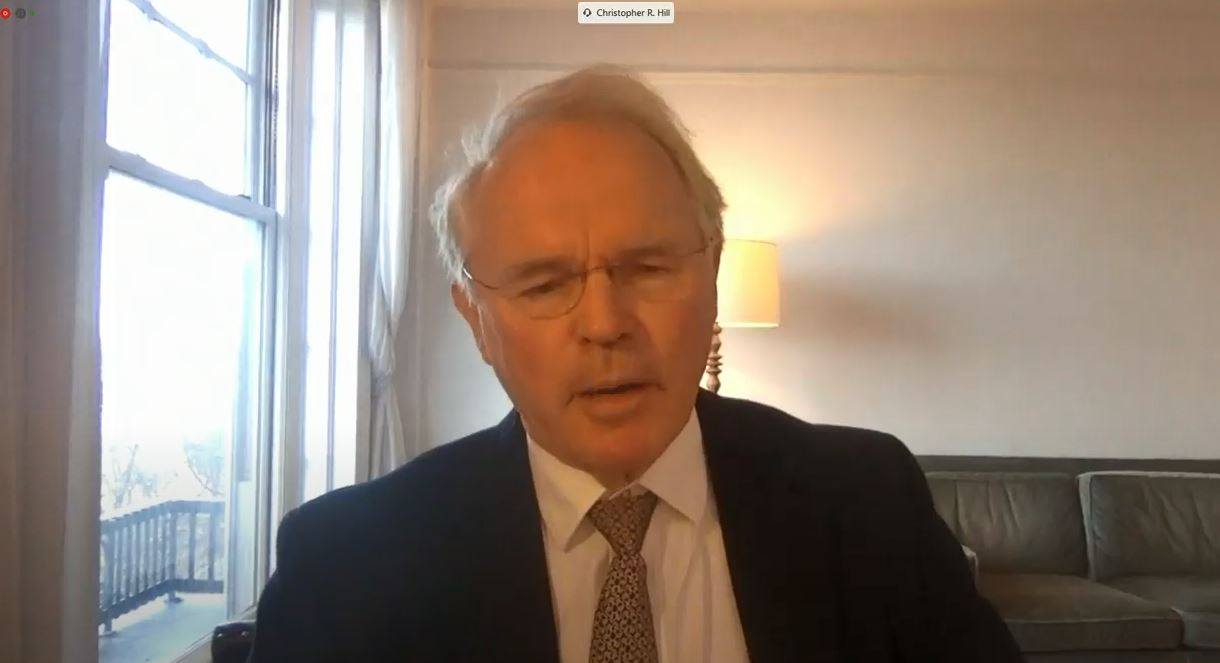
It is important to take a second look at the Dayton Peace Agreement and see what can be done in terms of Bosnia’s government structures and the United States should participate in that process, a member of the U.S. negotiating team in the peace talks for BiH, Christopher Hill, said at a Tuesday video conference marking the 25th anniversary of the Agreement.
The international conference, named “The Legacy of Peace – 25 Years of the Dayton-Paris Peace Agreement,” was organised by Croatia’s Ministry of Foreign and European Affairs and Croatian Academy of Sciences.
The 1995 Dayton Peace Agreement includes Bosnia’s Constitution.
The anniversary of the Agreement is an issue “of great importance in European security and the sharing of international values," said Hill.
Hill was a member of the team led by late U.S. diplomat Richard Holbrooke, whom he called a “difficult person,” but added that “a difficult problem like peace in Bosnia required to some extent a difficult person to deal with.”
Hestressed the importance of understanding the historical setting of the Dayton Agreement, which was soon after the collapse of the Berlin Wall, when “many U.S. politicians talked about a Europe, whole and free, and peace.”
“And yet, we saw in the Balkans that Europe was not whole, and certainly not free and not at peace,” he said, adding that “what happened in Bosnia is a brutal reminder to us that these issues don’t just begin and end when walls fall, they require our constant efforts in trying to address them and constant efforts to try to work together in a collegial spirit.”
There was a lot of frustration in the international community during the peace talks and it tried to address the problems in the Balkans “sometimes with a lack of appreciation for the history of the Balkans,” he said.
“The supply of Balkan history is perhaps greater than the demand for understanding Balkan history,” Hill said, explaining that many observers who are not from the region had an “impatience with what was going on.”
“Yugoslavia was a collapsing state. It was seen by many Serbs as a conspiracy to deny Serbia its rightful place, but it was seen by many other people in Yugoslavia as a conspiracy to enshrine Serbia’s leadership in that country,” Hill said.
The international community then “looked for quick solutions,” he explained, such as the 1992 Bosnian independence referendum, hoping that “it would somehow (...) create the peace where everybody would agree to whoever prevailed in the referendum.”
“Clearly, it did not (happen), and the consequence was very brutal,” Hill said, adding that it produces a situation where the map of Bosnia began to change, “not so much in its external boundaries, but more importantly within Bosnia” where there were “efforts to impose leadership, usually by the Bosnian Serb population, (which was) not content at all to live in a state called Bosnia and Herzegovina.”
Although the EU worked very hard on this problem, “it soon became apparent that we needed all hands on deck,” he said.
What came out, in the end, was an “amalgamation of a lot of different concepts and principles” and very soon there was a “sense that things need to be fixed in Bosnia” and that the agreement was not the “means by which to govern” the country, Hill explained.
When talking about the setup of BiH, there are certain principles which must be observed, and among them is the principle that “you do not force changes on the others through the threat of force,” Hill said.
He stressed that the international community is “not prepared to see a break-up of Bosnia.”
“It is very important to take a second look at Dayton (Agreement) and at what needs to be done in terms of government structures,” he said, arguing that it is very important that the U.S. is involved in this process.
Kakvo je tvoje mišljenje o ovome?
Učestvuj u diskusiji ili pročitaj komentare





 Srbija
Srbija
 Hrvatska
Hrvatska
 Slovenija
Slovenija







